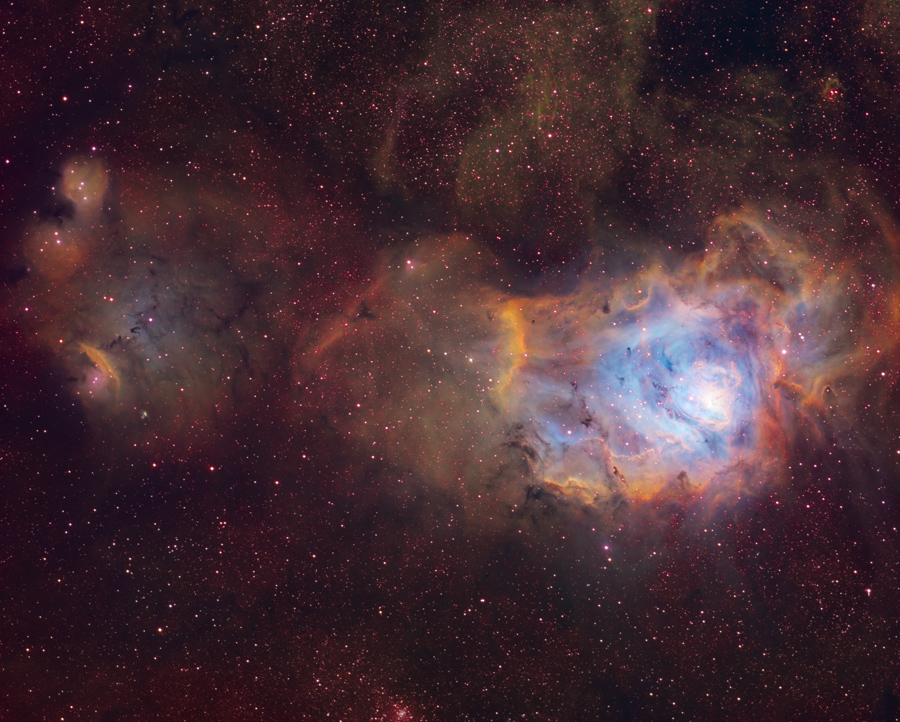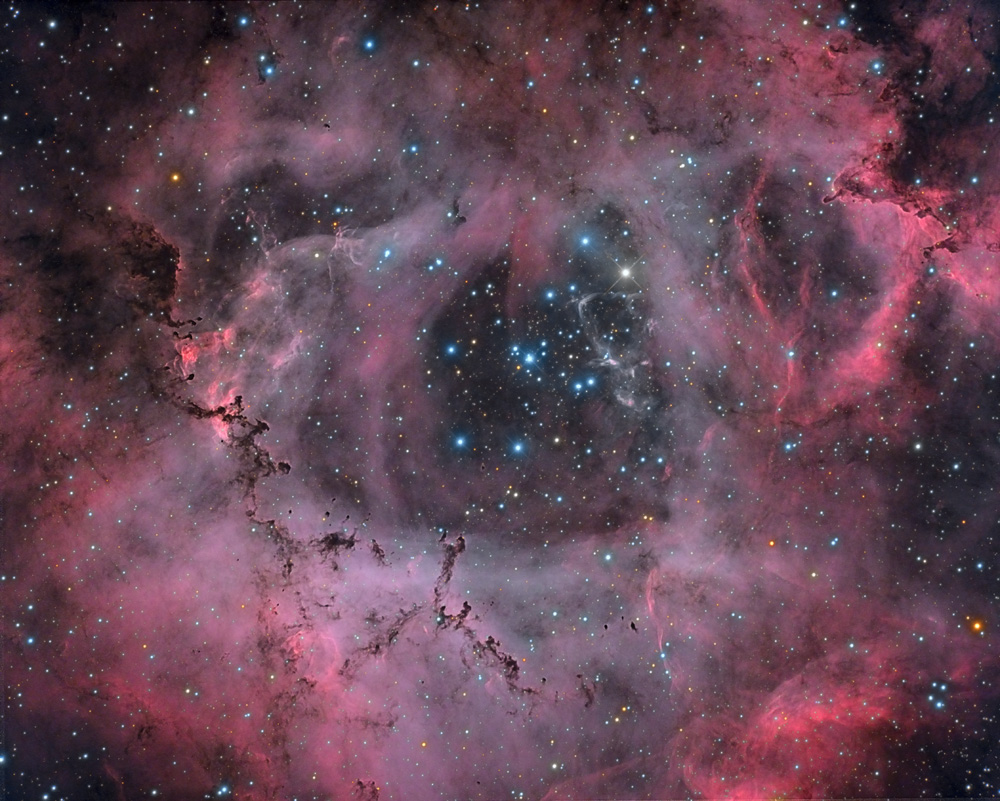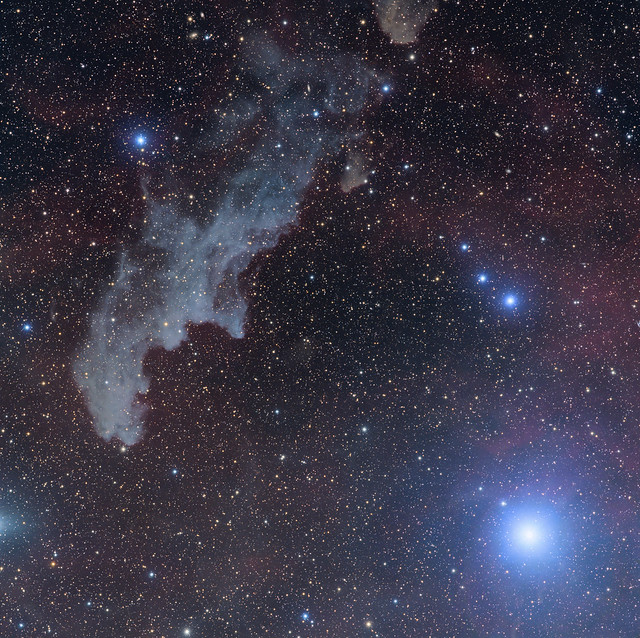Submissions: 2017 December
-
KuriousGeorge
- Science Officer
- Posts: 218
- Joined: Wed Dec 30, 2015 7:07 am
- Location: San Diego, CA
- Contact:
Re: Submissions: 2017 December
Tadpole Nebula (IC 410, SH2 236). KG Observatory.
The Tadpole Nebula lies about 12,000 light-years away in the northern constellation of the Charioteer (Auriga). These two relatively dense streamers of material are potential sites of ongoing star formation. These cosmic "tadpole" shapes are about 10 light-years long.
Imaging telescope or lens: Celestron 8" EdgeHD
Imaging camera: QSI 660 WSG
Mount: Losmandy G-11
Guiding camera: Starlight Xpress Ultrastar
Software: PixInsight 1.8, PHD Guiding 2, Neat Image V7, Photoshop CS3, Sequence Generator Pro, Maxim DL6
Filters: Astrodon 1.25" 3nm SII, Astrodon 1.25" 3nm OIII, Astrodon 1.25" 5nm Ha
Accessories: Innovations Foresight ONAG SC, Optec FocusLock, Starizona MicroTouch Autofocuser
Resolution: 2714x2150
Dates: Dec. 6, 2017, Dec. 7, 2017
Frames:
Astrodon 1.25" 3nm OIII: 12x900" -15C bin 1x1
Astrodon 1.25" 3nm SII: 12x900" -15C bin 1x1
Astrodon 1.25" 5nm Ha: 12x900" -15C bin 1x1
Integration: 9.0 hours
Darks: ~20
Flats: ~60
Flat darks: ~60
Bias: ~20
Avg. Moon age: 18.60 days
Avg. Moon phase: 84.04%
Mean SQM: 19.50
Astrometry.net job: 1850837
RA center: 80.784 degrees
DEC center: 33.531 degrees
Pixel scale: 0.642 arcsec/pixel
Orientation: 90.789 degrees
Field radius: 0.309 degrees
Locations: Home, Rancho Santa Fe, California, United States
The Tadpole Nebula lies about 12,000 light-years away in the northern constellation of the Charioteer (Auriga). These two relatively dense streamers of material are potential sites of ongoing star formation. These cosmic "tadpole" shapes are about 10 light-years long.
Imaging telescope or lens: Celestron 8" EdgeHD
Imaging camera: QSI 660 WSG
Mount: Losmandy G-11
Guiding camera: Starlight Xpress Ultrastar
Software: PixInsight 1.8, PHD Guiding 2, Neat Image V7, Photoshop CS3, Sequence Generator Pro, Maxim DL6
Filters: Astrodon 1.25" 3nm SII, Astrodon 1.25" 3nm OIII, Astrodon 1.25" 5nm Ha
Accessories: Innovations Foresight ONAG SC, Optec FocusLock, Starizona MicroTouch Autofocuser
Resolution: 2714x2150
Dates: Dec. 6, 2017, Dec. 7, 2017
Frames:
Astrodon 1.25" 3nm OIII: 12x900" -15C bin 1x1
Astrodon 1.25" 3nm SII: 12x900" -15C bin 1x1
Astrodon 1.25" 5nm Ha: 12x900" -15C bin 1x1
Integration: 9.0 hours
Darks: ~20
Flats: ~60
Flat darks: ~60
Bias: ~20
Avg. Moon age: 18.60 days
Avg. Moon phase: 84.04%
Mean SQM: 19.50
Astrometry.net job: 1850837
RA center: 80.784 degrees
DEC center: 33.531 degrees
Pixel scale: 0.642 arcsec/pixel
Orientation: 90.789 degrees
Field radius: 0.309 degrees
Locations: Home, Rancho Santa Fe, California, United States
-
Hermann von Eiff
- Ensign
- Posts: 43
- Joined: Mon Sep 26, 2016 5:48 pm
Re: Submissions: 2017 December
NGC 281 The Pacman Nebula
Copyright: Hermann von Eiff
Copyright: Hermann von Eiff
-
barretosmed
- Science Officer
- Posts: 483
- Joined: Thu Oct 12, 2017 6:04 pm
Re: Submissions: 2017 December
METHANE IN JUPITER AND SATURN
https://www.astrobin.com/full/311455/0/ ... page=2&nc=
Copyright: Fernando Oliveira de Menezes
EQUIPAMENTS: CELESTRON CPC C11 EDGE, ASI 290 mc, powermate 2,5x
Local, Date: 09/10/2017, São Paulo – SP - Brazil
https://www.astrobin.com/full/311455/0/ ... page=2&nc=
Copyright: Fernando Oliveira de Menezes
EQUIPAMENTS: CELESTRON CPC C11 EDGE, ASI 290 mc, powermate 2,5x
Local, Date: 09/10/2017, São Paulo – SP - Brazil
-
barretosmed
- Science Officer
- Posts: 483
- Joined: Thu Oct 12, 2017 6:04 pm
Re: Submissions: 2017 December
METHANE IN SATURN
Methane (CH4) a gas that in contact with the Earth's atmosphere can have high inflatable power, exists in other planets, source of abiotic products.
In the near infrared at 890 nm. This filter is very interesting because, unlike all the others, it does not reveal information regarding the color differences of the planet, but the relative altitude of the cloud structures!
The brightness of a particular detail is directly correlated with its relative altitude in the Jovian atmosphere: the brighter it is, the higher it is. We observe that the red patches of the planet (GRS, BA) and the south polar cap are the highest structures ... This kind of information is very valuable.
This image was taken at wavelengths of light that are absorbed by methane on Saturn
The basic reason that there are gases heavier than hydrogen in the upper atmosphere of Saturn and its anes is that it is hot enough for methane, ammonia, etc. in the atmosphere are gaseous (they do not condense into a liquid) and the atmosphere is well mixed by convection.
What struck me was that no significant amounts of methane were detected on the moons of Saturn, I tried to verify the northern region of Titan, with an intense focus on it, but did not detect significant amount of methane in gaseous form, which was a surprise. Studies have been done on several consecutive nights, I am exposing some of the 1500 images made.
EQUIPAMENTS: CELESTRON CPC C11 EDGE, ASI 290 mc, powermate 2,5x, Filter methane
Local, Date: 09/10/2017, São Paulo – SP - Brazil
https://www.astrobin.com/full/311398/0/ ... page=2&nc=
Copyright: Fernando Oliveira de Menezes
Methane (CH4) a gas that in contact with the Earth's atmosphere can have high inflatable power, exists in other planets, source of abiotic products.
In the near infrared at 890 nm. This filter is very interesting because, unlike all the others, it does not reveal information regarding the color differences of the planet, but the relative altitude of the cloud structures!
The brightness of a particular detail is directly correlated with its relative altitude in the Jovian atmosphere: the brighter it is, the higher it is. We observe that the red patches of the planet (GRS, BA) and the south polar cap are the highest structures ... This kind of information is very valuable.
This image was taken at wavelengths of light that are absorbed by methane on Saturn
The basic reason that there are gases heavier than hydrogen in the upper atmosphere of Saturn and its anes is that it is hot enough for methane, ammonia, etc. in the atmosphere are gaseous (they do not condense into a liquid) and the atmosphere is well mixed by convection.
What struck me was that no significant amounts of methane were detected on the moons of Saturn, I tried to verify the northern region of Titan, with an intense focus on it, but did not detect significant amount of methane in gaseous form, which was a surprise. Studies have been done on several consecutive nights, I am exposing some of the 1500 images made.
EQUIPAMENTS: CELESTRON CPC C11 EDGE, ASI 290 mc, powermate 2,5x, Filter methane
Local, Date: 09/10/2017, São Paulo – SP - Brazil
https://www.astrobin.com/full/311398/0/ ... page=2&nc=
Copyright: Fernando Oliveira de Menezes
-
barretosmed
- Science Officer
- Posts: 483
- Joined: Thu Oct 12, 2017 6:04 pm
Re: Submissions: 2017 December
Great Red Spot
https://www.astrobin.com/full/298689/0/ ... page=2&nc=
Copyright: Fernando Oliveira de Menezes
EQUIPAMENTS: CELESTRON CPC C11 EDGE, ASI 290 mc, powermate 2,5x
Astrophotography: Fernando Oliveira de Menezes
Date: 06/06/2017, 21:00
https://www.astrobin.com/full/298689/0/ ... page=2&nc=
Copyright: Fernando Oliveira de Menezes
EQUIPAMENTS: CELESTRON CPC C11 EDGE, ASI 290 mc, powermate 2,5x
Astrophotography: Fernando Oliveira de Menezes
Date: 06/06/2017, 21:00
-
barretosmed
- Science Officer
- Posts: 483
- Joined: Thu Oct 12, 2017 6:04 pm
Re: Submissions: 2017 December
NEPTUNE
Dark, cold and whipped by supersonic winds, Neptune is the last of the hydrogen and helium gas giants in our solar system. More than 30 times as far from the sun as Earth, the planet takes almost 165 Earth years to orbit our sun. In 2011 Neptune completed its first orbit since its discovery in 1846.
https://www.astrobin.com/full/312631/0/ ... real=&mod=
Copyright: Fernando Oliveira de Menezes
EQUIPAMENTS: CELESTRON CPC C11 EDGE, ASI 290 mc, powermate 2,5x
Local, Date: 09/17/2017, São Paulo – SP - Brazil
Dark, cold and whipped by supersonic winds, Neptune is the last of the hydrogen and helium gas giants in our solar system. More than 30 times as far from the sun as Earth, the planet takes almost 165 Earth years to orbit our sun. In 2011 Neptune completed its first orbit since its discovery in 1846.
https://www.astrobin.com/full/312631/0/ ... real=&mod=
Copyright: Fernando Oliveira de Menezes
EQUIPAMENTS: CELESTRON CPC C11 EDGE, ASI 290 mc, powermate 2,5x
Local, Date: 09/17/2017, São Paulo – SP - Brazil
Re: Submissions: 2017 December
My simply contribute.
Location Reggio Emilia Italy date 09 Dec 2017. Main Scope C8EdgeHD, reducted with Starizona Fastar Adapter (426mm F2.1). Main Camera QHYCDD QHY8L, Guide Camera QHYCDD QHY5-IIM on QHYCDD Miniscope 30/130mm. Optolong L-Pro filter. Sum of 13 Light of 240sec, 22 Light of 90Sec, 6 Light of 30 sec. Dark Bias no Flat. Elaboration PixInsight and PhotoShop
Location Reggio Emilia Italy date 09 Dec 2017. Main Scope C8EdgeHD, reducted with Starizona Fastar Adapter (426mm F2.1). Main Camera QHYCDD QHY8L, Guide Camera QHYCDD QHY5-IIM on QHYCDD Miniscope 30/130mm. Optolong L-Pro filter. Sum of 13 Light of 240sec, 22 Light of 90Sec, 6 Light of 30 sec. Dark Bias no Flat. Elaboration PixInsight and PhotoShop
-
barretosmed
- Science Officer
- Posts: 483
- Joined: Thu Oct 12, 2017 6:04 pm
Re: Submissions: 2017 December
MOON
https://www.astrobin.com/full/316179/0/?nc=user
Copyright: Fernando Oliveira de Menezes
EQUIPAMENTS: ESPRIT 150 ED, ASI 290 mc
DATE: 10/11/2017
Local: São Paulo – SP
https://www.astrobin.com/full/316179/0/?nc=user
Copyright: Fernando Oliveira de Menezes
EQUIPAMENTS: ESPRIT 150 ED, ASI 290 mc
DATE: 10/11/2017
Local: São Paulo – SP
- Attachments
-
- LUA COM CONTRASTEjpgAPOD.jpg (70.97 KiB) Viewed 24167 times
-
jaspalchadha
- Ensign
- Posts: 52
- Joined: Tue Jun 09, 2015 10:23 am
- Location: England
- Contact:
Re: Submissions: 2017 December
Open Star Clusters M35 and NGC 2158
Jaspal Chadha, LONDON UK
Jaspal Chadha, LONDON UK
-
markh@tds.net
- Science Officer
- Posts: 117
- Joined: Wed Oct 03, 2012 7:44 pm
Re: Submissions: 2017 December
"The Lost Pillar of Creation"
Copyright: Mark Hanson
Most know of the "Pillars of Creation,” which is a famous image from the Hubble Space Telescope, but few know of this hidden pillar. What a gem! This “no name” pillar is all alone in the dark shadows of the Heart and Soul Nebula. In between open cluster NGC 1024 and IC 1805, the pillar itself looks like a finger pointing to the wonderful Melotte 15 Nebula at the center of IC 1805.
"Sculpted by the energy of hot young stars, this starforming pillar is one example of a bright rimmed globule or "elephant trunk" structure found in the Heart Nebula. Eventually in the future, the gas in the Heart Nebula will be dispersed by the winds of the central star cluster." By Sakib Rasool
A beautiful, but quite faint object. It needs long Ha exposures to really make it pop out.
More info and high Resolution image here: https://www.hansonastronomy.com
Thank you,
Mark Hanson
Copyright: Mark Hanson
Most know of the "Pillars of Creation,” which is a famous image from the Hubble Space Telescope, but few know of this hidden pillar. What a gem! This “no name” pillar is all alone in the dark shadows of the Heart and Soul Nebula. In between open cluster NGC 1024 and IC 1805, the pillar itself looks like a finger pointing to the wonderful Melotte 15 Nebula at the center of IC 1805.
"Sculpted by the energy of hot young stars, this starforming pillar is one example of a bright rimmed globule or "elephant trunk" structure found in the Heart Nebula. Eventually in the future, the gas in the Heart Nebula will be dispersed by the winds of the central star cluster." By Sakib Rasool
A beautiful, but quite faint object. It needs long Ha exposures to really make it pop out.
More info and high Resolution image here: https://www.hansonastronomy.com
Thank you,
Mark Hanson
Re: Submissions: 2017 December
IC 1805, the heart nebula
http://www.bastienfoucher.com
Copyright: Bastien Foucher A high resolution image can be found here : https://photos.smugmug.com/Astrophotogr ... ic1805.jpg
http://www.bastienfoucher.com
Copyright: Bastien Foucher A high resolution image can be found here : https://photos.smugmug.com/Astrophotogr ... ic1805.jpg
-
G.Chatzifrantzis
- Ensign
- Posts: 29
- Joined: Wed Nov 01, 2017 12:46 pm
Re: Submissions: 2017 December
NGC 6543 Cat's Eye Nebula
Copyright : G.Chatzifrantzis
Equipment :
OTA : Celestron C11 XLT
Mount : EQ8
Camera : Atik 460ex - Atik 460exc
Guiding : OAG via Lodestar X2
Filters : Baader Ha 7nm - Astronomik Oiii 6nm - CLS
SoftWare :
DSS - Pix - Cs
Exposure :
Ha : 4h30min
Oiii : 6h40min
RGB : 2h10min
Copyright : G.Chatzifrantzis
Equipment :
OTA : Celestron C11 XLT
Mount : EQ8
Camera : Atik 460ex - Atik 460exc
Guiding : OAG via Lodestar X2
Filters : Baader Ha 7nm - Astronomik Oiii 6nm - CLS
SoftWare :
DSS - Pix - Cs
Exposure :
Ha : 4h30min
Oiii : 6h40min
RGB : 2h10min
Re: Submissions: 2017 December
Orion's Trapezium
Full resolution:
http://a4.pbase.com/g10/85/890385/2/166 ... LAPSOa.jpg
Thanks for looking!!!
Kfir Simon
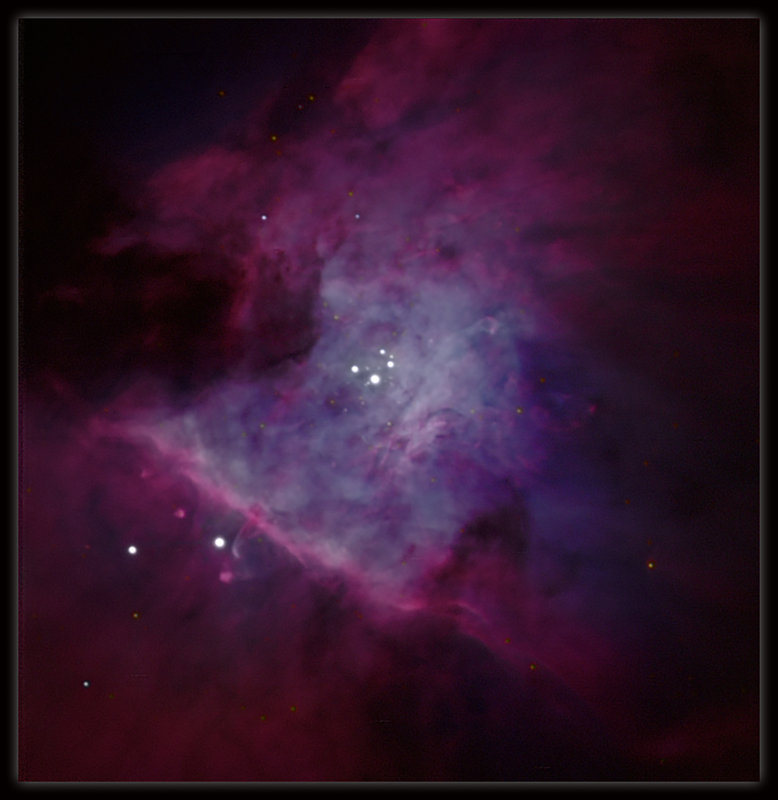
Full resolution:
http://a4.pbase.com/g10/85/890385/2/166 ... LAPSOa.jpg
Thanks for looking!!!
Kfir Simon

Re: Submissions: 2017 December
LBN 437 in Lacerta
Copyright Jon Talbot
Web link and higher res image here:
http://www.starscapeimaging.com/page216/index.html
Copyright Jon Talbot
Web link and higher res image here:
http://www.starscapeimaging.com/page216/index.html
- moonrocks
- Science Officer
- Posts: 119
- Joined: Tue Jun 30, 2015 6:50 pm
- Location: spain, valencia
- Contact:
Re: Submissions: 2017 December
Details from the Carina Nebula
URL of website, http://moonrocksastro.com/index.php/201 ... na-nebula/
http://moonrocksastro.com/wp-content/up ... Nebula.jpg
Processing and Copyright Paul C Swift
Credit: NASA, ESA, Hubble;
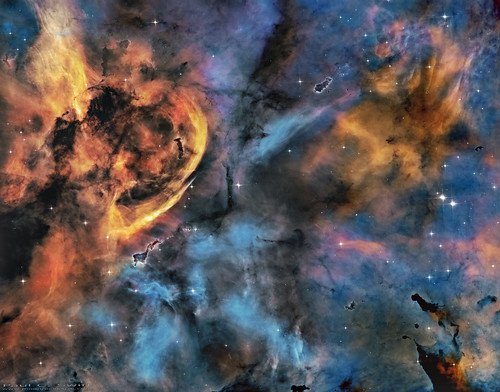 Details from the Carina Nebula by Paul C. Swift, on Flickr
Details from the Carina Nebula by Paul C. Swift, on Flickr
 "Thou Shalt Not" by Paul C. Swift, on Flickr
"Thou Shalt Not" by Paul C. Swift, on Flickr
URL of website, http://moonrocksastro.com/index.php/201 ... na-nebula/
http://moonrocksastro.com/wp-content/up ... Nebula.jpg
Processing and Copyright Paul C Swift
Credit: NASA, ESA, Hubble;
 Details from the Carina Nebula by Paul C. Swift, on Flickr
Details from the Carina Nebula by Paul C. Swift, on Flickr "Thou Shalt Not" by Paul C. Swift, on Flickr
"Thou Shalt Not" by Paul C. Swift, on Flickr-
astronut2007
- Ensign
- Posts: 41
- Joined: Thu Feb 02, 2012 1:07 pm
Re: Submissions: 2017 December
CHRISTMAS STAR
https://www.flickr.com/photos/7776810@N07/22964923944/
Copyright: Alan C Tough
Although this looks like a Christmas ornament, Canopus (Alpha Carinae) is the second brightest star in the night sky and is, arguably, a candidate for the fabled Star of Bethlehem.
https://www.flickr.com/photos/7776810@N07/22964923944/
Copyright: Alan C Tough
Although this looks like a Christmas ornament, Canopus (Alpha Carinae) is the second brightest star in the night sky and is, arguably, a candidate for the fabled Star of Bethlehem.
-
Steve Pastor
- Ensign
- Posts: 26
- Joined: Mon Jun 20, 2016 5:20 pm
Re: Submissions: 2017 December
A portion of the Eastern Veil Nebula in Cygnus
Pictured is a portion of the Eastern Veil Nebula, NGC 6992, in Cygnus. The Veil Nebula is the result of a supernova explosion about 15,000 years ago. This bicolor narrowband image was taken through a Hydrogen-alpha filter and an Oxygen[III] filter, with the Red channel assigned to H-alpha, Green channel assigned to 70% H-alpha + 30% O[III], and the Blue channel assigned to 90% O[III]. The image was a total of 8 hrs 20 min exposure with a Takahashi CCA-250 f/5 astrograph and a QSIwsg CCD camera with Astrodon filters (H-alpha 5 nm; O[III] 3 nm) on a Paramount ME in Mayhill, NM on the nights of 17, 23, 24 October 2017 (O[III]: 16 x 1200 sec lights @ -20 degrees C; H-alpha 9 x 1200 sec lights @ -20 degrees C; 24 darks; 128 bias; 128 flats). Processed in PixInsight 1.8.5.1353 Ripley (x64).
Pictured is a portion of the Eastern Veil Nebula, NGC 6992, in Cygnus. The Veil Nebula is the result of a supernova explosion about 15,000 years ago. This bicolor narrowband image was taken through a Hydrogen-alpha filter and an Oxygen[III] filter, with the Red channel assigned to H-alpha, Green channel assigned to 70% H-alpha + 30% O[III], and the Blue channel assigned to 90% O[III]. The image was a total of 8 hrs 20 min exposure with a Takahashi CCA-250 f/5 astrograph and a QSIwsg CCD camera with Astrodon filters (H-alpha 5 nm; O[III] 3 nm) on a Paramount ME in Mayhill, NM on the nights of 17, 23, 24 October 2017 (O[III]: 16 x 1200 sec lights @ -20 degrees C; H-alpha 9 x 1200 sec lights @ -20 degrees C; 24 darks; 128 bias; 128 flats). Processed in PixInsight 1.8.5.1353 Ripley (x64).
-
ashtree
- Ensign
- Posts: 14
- Joined: Thu May 06, 2010 11:53 pm
- AKA: Adam_Jesion
- Location: Warsaw / Poland
- Contact:
Re: Submissions: 2017 December
Hot Lagoon Nebula, M8 Narrowband
Hi Res - https://astropolis.pl/uploads/monthly_2 ... b40c7d.jpg
Copyright: Adam Jesionkiewicz CMOS camera: ZWO ASI1600MM-C + Baader Narrowband filters, mount: iOptron CEM25EC, refractor: WO APO71 f4.9. Location: South Africa (near Sutherland and SALT observatory)
Hi Res - https://astropolis.pl/uploads/monthly_2 ... b40c7d.jpg
Copyright: Adam Jesionkiewicz CMOS camera: ZWO ASI1600MM-C + Baader Narrowband filters, mount: iOptron CEM25EC, refractor: WO APO71 f4.9. Location: South Africa (near Sutherland and SALT observatory)
Last edited by ashtree on Tue Dec 12, 2017 2:05 pm, edited 1 time in total.
Re: Submissions: 2017 December
The Heart of The Rosette
http://www.buckeyestargazer.net
Copyright: Joel Short This image, consisting of HaRGB data over 11hrs, was taken in one night with my dual telescope/camera imaging rig. A CFF250RC (10" RC) took Ha data in 20min subs while a SV80ST (80mm refractor) took separate R, G, B data in 3min subs.
This setup allows me to capture enough data to complete an image in one night, whereas before it would take 2-3 clear nights to capture.
http://www.buckeyestargazer.net
Copyright: Joel Short This image, consisting of HaRGB data over 11hrs, was taken in one night with my dual telescope/camera imaging rig. A CFF250RC (10" RC) took Ha data in 20min subs while a SV80ST (80mm refractor) took separate R, G, B data in 3min subs.
This setup allows me to capture enough data to complete an image in one night, whereas before it would take 2-3 clear nights to capture.
Re: Submissions: 2017 December
Orion Nebular Complex
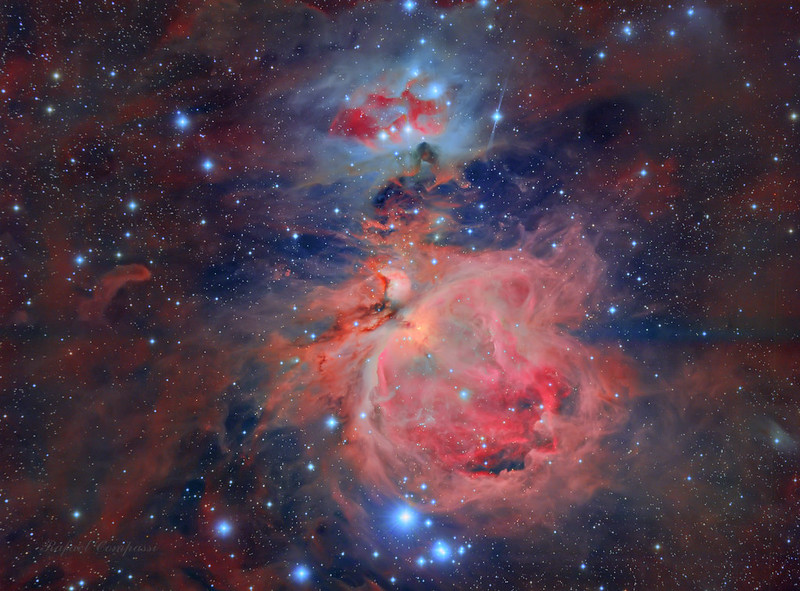 M42 Revision 2 by Rafael Compassi, no Flickr
M42 Revision 2 by Rafael Compassi, no Flickr
80mm F/5 Triplet APO
QHY9m
Baader 36mm unmounted filters
L:65x300s
Ha:45x300s
G, B 12x300s
 M42 Revision 2 by Rafael Compassi, no Flickr
M42 Revision 2 by Rafael Compassi, no Flickr80mm F/5 Triplet APO
QHY9m
Baader 36mm unmounted filters
L:65x300s
Ha:45x300s
G, B 12x300s
Re: Submissions: 2017 December
link for high res, https://www.astrobin.com/325642/Rolando Ligustri wrote:comet C / 2017 O1 ASASSN in a passage near the polar, today 13 December.
-
vanamonde81
- Science Officer
- Posts: 143
- Joined: Fri Apr 12, 2013 7:46 am
Re: Submissions: 2017 December
Geminids 2017
Copyright: György Soponyai
On the night of 13th December 2017 I decided to travel to Galyatető in the Mátra mountains for capturing the outburst of Geminids meteor shower. Here the elevation is 985 meters (955 + 30 of the tower) that is slightly lower than the height of Kékes (1014m), the highest mountain of Hungary. The Kékes is visible at the rightmost pole on this photo.
The geodetic tower of Galyatető was built in 1934 but at the beginning of the age of GPS these kind of towers became obsolete and uneless. The old building was renovated in 2015 and today it is the highest lookout tower of the country.
I had slightly more than two crystall-clear hours before midnight when the fog layer reached the mountaintop finally.

2017.12.13.
Galyatető, Hungary
Canon EOS 5D Mark II + Samyang EF 14/2.8
Copyright: György Soponyai
On the night of 13th December 2017 I decided to travel to Galyatető in the Mátra mountains for capturing the outburst of Geminids meteor shower. Here the elevation is 985 meters (955 + 30 of the tower) that is slightly lower than the height of Kékes (1014m), the highest mountain of Hungary. The Kékes is visible at the rightmost pole on this photo.
The geodetic tower of Galyatető was built in 1934 but at the beginning of the age of GPS these kind of towers became obsolete and uneless. The old building was renovated in 2015 and today it is the highest lookout tower of the country.
I had slightly more than two crystall-clear hours before midnight when the fog layer reached the mountaintop finally.

2017.12.13.
Galyatető, Hungary
Canon EOS 5D Mark II + Samyang EF 14/2.8
Re: Submissions: 2017 December
LBN 437 in Lacerta
14 Hours
Deep Sky West Remote Observatory
Lloyd Smith
14 Hours
Deep Sky West Remote Observatory
Lloyd Smith
-
strongmanmike
The Witch Head Nebula IC2118
About 900 light years away, this faint molecular cloud lies in the constellation Eridanus but it is actually lit up by the brilliant giant blue white star Rigel, the brightest star in Orion and seventh brightest star in the sky. Faint red hydrogen emission also permeates the whole scene. The profile of a witch's face is clearly seen in the cloud, complete with straggly hair, big eye sockets, a hooked nose, open mouth and big chin
Full resolution image here: http://www.pbase.com/strongmanmike2002/ ... 4/original
https://c1.staticflickr.com/5/4546/3820 ... 26c5_c.jpg
Copyright: Michael Sidonio
Full resolution image here: http://www.pbase.com/strongmanmike2002/ ... 4/original
https://c1.staticflickr.com/5/4546/3820 ... 26c5_c.jpg
Copyright: Michael Sidonio
Last edited by bystander on Sat Dec 16, 2017 4:15 pm, edited 1 time in total.
Reason: Please, no hotlinks to images > 500Kb. Substituted smaller image.
Reason: Please, no hotlinks to images > 500Kb. Substituted smaller image.
Re: Submissions: 2017 December
Dusty Iris Nebula
Hi all
High resolution image and technical data:
http://www.javierlaina.es/IMAGENES/Iris.html
Copyright: Javier Laina (Spain)
Best Regards
http://www.javierlaina.es/IMAGENES/Iris.jpg
Hi all
High resolution image and technical data:
http://www.javierlaina.es/IMAGENES/Iris.html
Copyright: Javier Laina (Spain)
Best Regards
http://www.javierlaina.es/IMAGENES/Iris.jpg
Last edited by bystander on Sun Oct 14, 2018 2:55 pm, edited 1 time in total.
Reason: Please, no hotlinks to images > 500Kb.
Reason: Please, no hotlinks to images > 500Kb.






